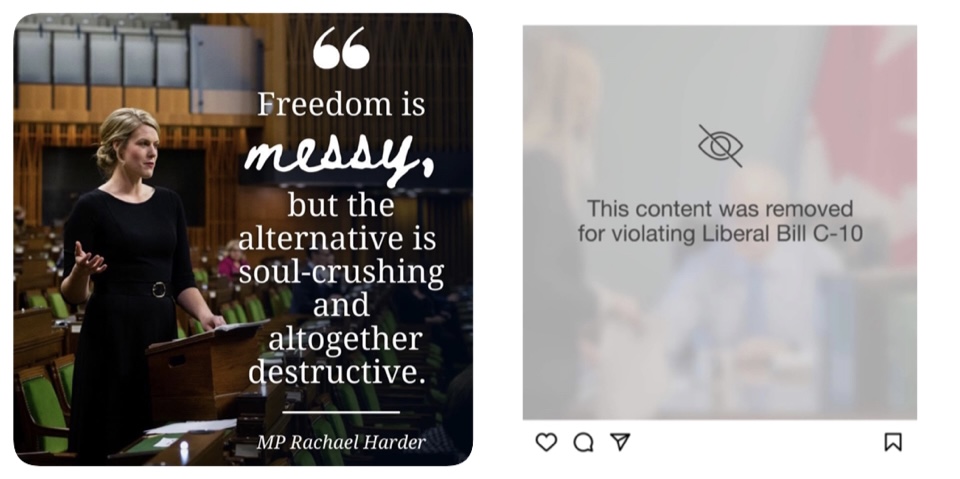-
-
What is Bill C-10?

Bill C-10—An Act to amend the Broadcasting Act and to make related and consequential amendments to other Acts – was first introduced in the House of Commons on November 3, 2020.
When it was first introduced, the stated intent of the bill was to ensure that online broadcasting is covered under the Act; updates broadcasting and regulatory policies to better reflect the diversity of Canadian society, including gender equality, LGBTQ+ and racialized communities, persons with disabilities, and Indigenous Peoples; and modernizes and provides the CRTC with new enforcement powers through an administrative monetary penalty scheme.
The amendments to the Act would require online broadcasters to contribute to the Canadian broadcasting system and will provide the Canadian Radio-television and Telecommunications Commission (CRTC) with the modern tools it needs to keep up with technological changes. The bill also provides that the Canadian broadcasting system should reflect the needs and interests of all Canadians—including Francophones and Anglophones, Indigenous Peoples, Canadians from racialized communities, and Canadians of diverse ethnocultural backgrounds, socioeconomic statuses, abilities and disabilities, sexual orientations, gender identities and expressions, and ages.
Initially, the government’s stated plan was to:- Confirm that online broadcasting is covered under the Act
- Update broadcasting and regulatory policies to better reflect the diversity of Canadian society, including gender equality, LGBTQ+ and racialized communities, persons with disabilities, and Indigenous Peoples
- Create a more flexible approach to regulation that allows the CRTC to establish rules for all broadcasting services that operate in Canada, including rules that create more sustainable sources of funding for Canadian stories
- Modernize the CRTC’s enforcement powers
- Update oversight and information-sharing provisions to reinforce the CRTC’s role as a modern and independent regulator
Bill C-10 Drastically Changed
However, things took a very different turn on April 23, 2021, when the Liberals removed a section from their own bill that protected Canadians from falling under the same regulatory policies when posting user-generated content on social media platforms.
Significant Criticism from Experts :
“It’s difficult to contemplate the levels of moral hubris, incompetence or both that would lead people to believe such an infringement of rights is justifiable,”- Peter Menzies, a former commissioner of the Canadian Radio-Television and Telecommunications Commission.
- University of Ottawa professor Michael Geist
The Minister of Justice prepared a Charter Statement for this bill to assure Canadians there were no inconsistencies with the legislation and the Canadian Charter of Rights and Freedoms.
In the Justice Minister’s November Charter Statement, it says:
“Clause 3 would specify that the Act does not apply in respect of programs uploaded by unaffiliated users to social media services for sharing with other users, and in respect of online undertakings whose only broadcasting consists of such programs.
The Bill would provide the Commission with new powers to regulate online services, and update the Commission’s regulatory powers as they relate to traditional broadcasters.”
Clause 3 is the section that the Liberals removed from their bill, thereby removing the protections of Canadians’ Charter rights and freedoms.
This is the section within clause 3 that was removed on April 23, 2021:
4.1 (1) This Act does not apply in respect of
(a) programs that are uploaded to an online undertaking that provides a social media service by a user of the service — who is not the provider of the service or the provider’s affiliate, or the agent or mandatary of either of them — for transmission over the Internet and reception by other users of the service; and
(b) online undertakings whose broadcasting consists only of such programs.
The removal of section 4.1 of Bill C-10 fundamentally changes the legislations and dissolves the ground on which the Charter Statement stood to justify Charter compliance.
Conservative Motion
On April 30, 2021, I moved a motion at the Canadian Heritage Committee requesting a new Charter Statement from the Justice Minister based on the transformational edit to the Bill. We need the Justice Minister to reevaluate Bill C-10 to determine whether it still is compliant with the Charter of Rights and Freedoms.
Soon after I introduced the motion, the Liberals shut down the debate.
The discussion continued at the next meeting, and it seems the NDP member and The Bloc Quebecois have come onto our side in favour of the Motion. We shall see what transpires at tomorrow’s committee meeting.
This is About Canadians
This is about protecting Canadians freedom of speech and freedom of expression. Social media platforms are the new public square, and free speech on those platforms in the form of user-generated content, such as videos and other content posted to sites like YouTube must not fall under the regulatory purview of the CRTC.
At one point, this was a main concern for the government. Even the Heritage Minister touted the protections for individual Canadians in the Bill stating, “Our approach is balanced and we have made the choice to exclude a number of areas from the new regime,” “User-generated content will not be regulated.”
The Minister can no longer make these claims, because protection for user-generated content was deleted from Bill C-10 with the removal of Clause 3.Tell a Friend

